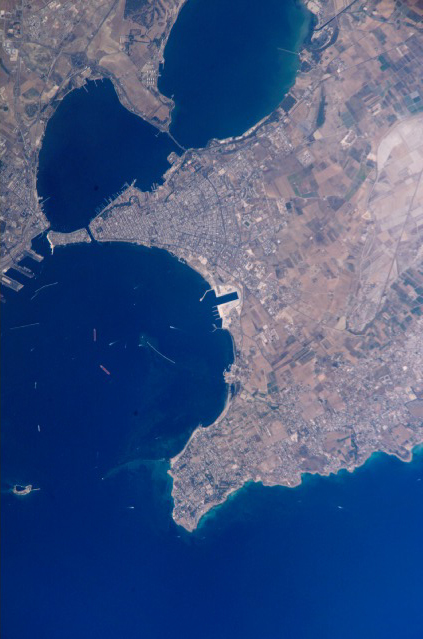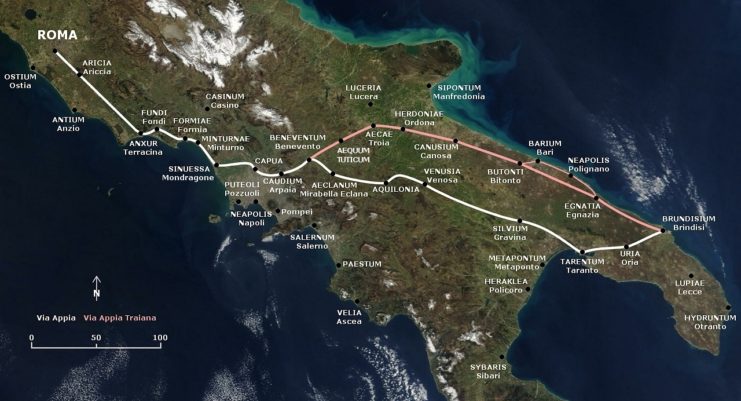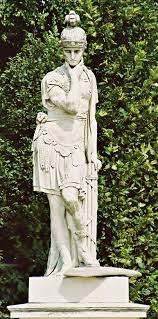The siege and battles of Tarentum were an underappreciated and often forgotten aspect of the second Punic War.The second Punic war between Carthage and Rome was a fierce conflict with countless major battles and sieges throughout the war’s 17 years. At the start of hostilities in 218 B.C.E. Rome had only recently subjugated parts of Southern Italy with the great Greek port city of Tarentum coming under Roman rule only approximately 50 years before Hannibal’s invasion. Tarentum (modern-day Taranto) was located on the coast of Southern Italy on the “heel”.
During the Second Punic War there were still people in Tarentum who remembered life before Roman rule and Tarentum had a history of opposing Rome; they were the ones who invited the famed Pyrrhus to invade Italy.
Hannibal made quite the gamble when he invaded Italy over the Alps in 218 BCE. Rome had had naval superiority in the Mediterranean since the conclusion of the first Punic War 23 years earlier. The route through the Alps was difficult for Hannibal and though Hannibal made it, he needed to secure a safe port and hopefully a decent naval force within Italy.
As part of his invasion strategy, Hannibal treated the Italian allies of the Latin Romans very well and released Italian prisoners after battles and killed the Roman citizens. Citizens of Tarentum were among those who fought for Rome as allies and seen the mercy of Hannibal. As Hannibal headed closer to Tarentum he received word from Tarentine officers he had freed earlier that they would open the city to him. As soon as Rome received word of the plot they reinforced the city with pro-Roman forces and a Roman commander Marcus Livius.

Later (212 BCE) a Tarentine diplomat to Rome attempted to free several diplomatic hostages being kept in Rome. Diplomatic hostages often enjoyed a nice life as long as their home state cooperated, but the Tarentine hostages who attempted to escape were caught and executed. This led to several more Tarentine officials; many were related to the executed hostages, deciding to help Hannibal.
Hannibal communicated by sending conspirators in and out of the city with cattle and through other gates had conspirators bring in prized game or cattle as regular gifts to the garrison commanders. The conspirators waited for the night when a big feast was prepared and sprang into action. Hannibal sent the majority of his force (9,000) to the easternmost gate where the conspirators killed the guards and open the gate. To avoid a potential bottleneck, a second gate was taken by deceit. Three Carthaginians marched to a Western gate with a prize boar. Thinking this was another gift to the garrison commanders, the men were let in. it is important to note that the garrison believed that Hannibal’s forces were still quite far from the city and that the men bringing in game were simply other Tarentines or rural people.

As soon as the three Carthaginians were in the gates they overpowered the guards and secured a second entrance for around 1,000 Libyans. The majority of the city fell very quickly but the Roman commander Marcus Livius realized that there was little hope in defending the entire city and he took the remaining garrison and pro-Roman Tarentines into the citadel. The citadel of Tarentum lay on an island which was connected by a small bridge to the main city. it was an extremely defensible position, though Livius had very few men and their morale was low. On top of that, the Carthagians had secured the inner bay port of Tarentum along with their navy, though they couldn’t get out of the inner bay as the citadel commanded the narrow straight out to sea.
Hannibal decided to construct a wall facing the Roman occupied citadel to prevent an attack on the city. During the walls construction the Romans under Livius charged the wall and greatly disrupted its construction, though they suffered heavy casualties during the fighting and retreating back to the citadel. Livius’ troops could not afford to attack again, and Hannibal didn’t want to leave Tarentum without taking the citadel and freeing his new Tarentine navy. Hannibal resolved to take the citadel and constructed several siege engines. Shortly before the impending assault Livius’ garrison received several reinforcements by sea which allowed them to sally out and destroy the siege works and breathe a little easier.
By sparing the Tarentines and banning the sacking of the city, Hannibal had won most of the citizens over and when he revealed his plan of hauling the Tarentine ships through the city and into the Mediterranean they were more than eager to help. In no time the whole navy was out and able to completely blockade the Romans in the citadel. Though the Romans had unquestionable naval superiority at the beginning of the war, that navy was stretched thin and the Tarentine navy was too large for any other local force to handle.
One attempt to break the blockade was started by a former smuggler turned Roman captain Decimus Quinctius. Decimus was noted for his skills at raiding enemy ships and was given command and ordered to recruit more ships. Eventually Decimus had around 20 ships and made an effort to destroy the Tarentine navy to resupply the citadel garrison. A small but fierce naval battle was fought near the city and the two captains, Decimus for the Romans and Nico Percon for the Tarentine/Carthaginian force, collided and fought. Decimus was struck by a spear from Nico and killed, causing the rest of the Romans to scatter.

It would take three years before the Romans would make a serious attempt to recapture Tarentum. One of the Consuls elected that year (209) was Fabius Maximus. Fabius had already achieved fame for his delaying tactics which were frustratingly defensive but ultimately saved Rome after Hannibal’s early victories. Fabius took an army of 25,000 against Tarentum and sent 30 ships towards the harbor. Meanwhile the Roman Proconsul Marcus Marcellus was tasked with offering Hannibal battle to distract his main force which was only a short ways from Tarentum while the other Consul Quintus Fulvus was sent into the now Carthaginian sympathizing toe of Italy known as Bruttium. Marcellus was one of the only Roman commanders with the generalship and audacity to match with Hannibal and had experience against Hannibal having defending the city of Nola on three separate occasions against Hannibal’s assaults. Together Marcellus and Fabius were known as the sword and shield of Rome.
With Marcellus forcing an indecisive clash far from the city and Fulvus’ attacks bringing Hannibal further away, Fabius looked for a way into the city. He found it when he discovered that a sister of one of the Roman officers who lived in the city was a lover of one of the Carthaginian allied mercenary commanders in the main city. The mercenary commander was persuaded to betray the city and gathered some loyal soldiers to kill the gate guards and allow fabius’ forces in. to draw attention away from the main assault Fabius first signaled Livius to attack with his forces in the citadel, had the navy bombard the city and had some detachments of the main army attack other spots along the walls. With the Tarentine defenders thoroughly spread out, Fabius sent his main force through the now opened gate and easily took the city. All of the Tarentine citizens except those who went to the citadel with the Romans were killed or sold into slavery. Hannibal made no other attempts to take the city and would have a very difficult time securing any ports to resupply his invasion force.
The siege and battles of Tarentum are very unorthodox, even for something as varied as a siege. Though betrayal is a common method of taking cities, it does not often happen to both sides in the same city. Citadels in any city were intended to be difficult to capture but for the small Roman force to survive for three years with very sparse supplies was quite impressive. It took a fully planned campaign by two Consuls and a Proconsul to isolate Hannibal and recapture the city but with its capture the Romans regained a prominent city in southern Italy and denied Hannibal his port and navy. It was an extended siege with treachery and several battles near and far that impacted its outcome. The outcome being that Hannibal never actually fully controlled the port city he so coveted likely led to the struggle for Tarentum being forgotten among the other decisive engagements of the war.
By William McLaughlin for War History Online
